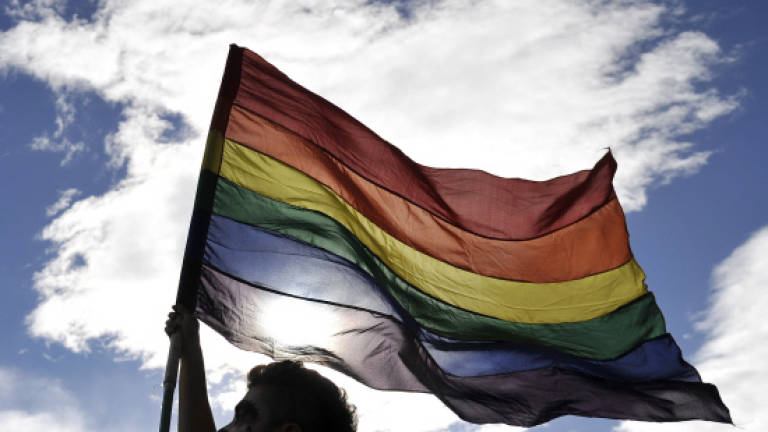Transgender debate: Toilets become a battleground in North Carolina

WHEN Janice Covington Allison enters a restaurant, the first thing she'll ask is whether she is permitted to use the ladies' restroom.
If the answer is yes, she stays.
"When they say no, I just walk out the door and go somewhere else to spend my money," she says.
And so far, nobody has refused her.
Allison is transgender – she is a woman, but her birth certificate lists "male" as her gender.
In Charlotte in the state of North Carolina where the 69-year-old lives, however, she is now prohibited from using the ladies' facilities.
Legislation recently passed by the North Carolina legislature permits transgender persons to use only those facilities of government buildings, courts and schools that correspond to the gender identification on their birth certificate.
Transgender issues are the latest in the list of gender– and sexual-orientation questions that American society continues to grapple with.
Transgender is a term for those people who do not – or not exclusively – identify with the gender given at their birth.
In many US states, North Carolina included, transgender people may only have their birth certificates altered if they undergo a sex-change operation.
Allison notes a problem with this: "You have people that cannot have sexual reassignment surgery because of other health problems."
She is pretty angry about the Republican governor of her state, Patrick McCrory.
"He along with the state legislators has it made illegal for me to use the lady's room in government buildings which I pay taxes on.
They claim transgender people are sexual predators and pedophiles.
The logic is crazy with this Republican governor."
Allison has seen and done a lot of things in her 69 years.
As a young man at age 17, Allison enlisted in the US Army and fought in Vietnam.
Later, she went to San Francisco, the city of hippies, "flower power" – and a budding gay and lesbian liberation scene.
"I read an article once that there are people like me in San Francisco.
Back then we did not have the internet; we did not have any talk about transgender people or even gay people," Allison recalls.
Much has changed in US society since then, with more liberal views slowly taking root.
This is evidenced in the Supreme Court decision that opened up same-sex marriage in all 50 states last year.
But North Carolina with its recent toilet facilities law is not an isolated case.
A handful of other states where Republican majorities hold sway have passed similar laws in recent months.
In Mississippi, for example, companies and churches are permitted to refuse to provide service to homosexuals on grounds of religious belief.
Mississippi and North Carolina are among the states of the South making up the so-called "Bible Belt" where evanglical protestant fundamentalism is deeply embedded, and where resistance to gay, lesbian and transgender issues has been the strongest.
"We have a lot of Jesus here," comments Erica Lachowitz, a transgender woman from Charlotte.
Her city, the largest in the state, is in other ways an upward-striving place.
Building cranes mark the skyline, and new glass-and-steel towers are going up everywhere.
Bank of America has its headquarters here, as do many other financial institutes and firms.
Charlotte's mayor, Jennifer Roberts, is a Democrat.
In February, the city council passed an order which permitted transgender persons to decide for themselves which restroom they visited.
But the order was overturned under the law passed by the state legislature.
The controversy has been brewing since last year, when the city council first took up the issue.
A lot of hate towards transgender people was voiced, and for one pizzeria owner, Juli Ghazi, the toxic atmosphere became too much.
She simply converted her restroom into a uni-sex facility, noting that "gender specific" toilets sometimes put people in uncomfortable situations.
Ghazi calls the new state legislation a scandal: "It makes citizens of our state feel like second class citizens. I think it is horrible."
Backers of the legislation make their case based on perceived safety aspects of public toilets and dressing rooms.
Governor McCrory put it this way in an interview: "Would you want a man to walk into your daughter's shower and legally be able to do that because mentally they think they are of the other gender?"
Those now targeted by the legislation can only shake their heads at such arguments.
"I have been a fully transitional woman for the past 13 years," says Candice Cox.
"I will look very out of place in the men's restroom.
You don't have to agree with me, you don't have to like what I have done with my personal life, but I ask that you respect me."
Since signing the legislation into law, McCrory has been confronted with heavy protests.
Musicians like Bruce Springsteen and Ringo Starr cancelled their concerts in North Carolina, while companies like Deutsche Bank and Paypal have shelved plans for creating new jobs in the state.
Several civil rights groups have filed a civil suit challenging the law.
McCrory then gave way a little, weakening some provisions of the law, but drawing the line at the gender-specific toilets.
The question now is, for how long? Last week, a US Appeals court ruled in favour of a transgender teenager who wanted to use the boys' restroom in a Virginia school.
That same court would have jurisdiction over any suit filed in North Carolina. — dpa